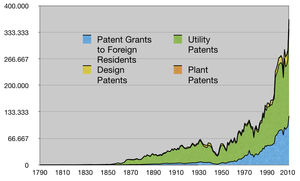
- Image via Wikipedia
While many people (especially politicians and the press) like to equate patents and innovation (often falsely suggesting that fewer patents means less innovation), studies have shown that patents are actually a really bad proxy for innovation, in that there’s simply no direct link between the two. And that’s a problem, considering that the patent system is supposed to be about creating more incentives for innovation. In fact, however, it often appears that the patent system is actually creating incentives to get more patents.
If you want a clear example of this, just look to China. Just recently, we noted that patenting was on the rise by Chinese companies, but a closer look at what’s happening in China suggests that it’s very much about incentives to increase patents, rather than incentives for greater innovation. In fact, it’s quite direct:
The Chinese government has created an ecosystem of incentives for its people to file patents.
Professors who do so are more likely to win tenure. Workers and students who file patents are more likely to earn a hukou (residence permit) to live in a desirable city. For some patents the government pays cash bonuses; for others it covers the substantial cost of filing. Corporate income tax can be cut from 25% to 15% for firms that file many patents. They are also more likely to win lucrative government contracts. Many companies therefore offer incentives to their employees to come up with patentable ideas.
The Latest Streaming News: Patents updated minute-by-minute








